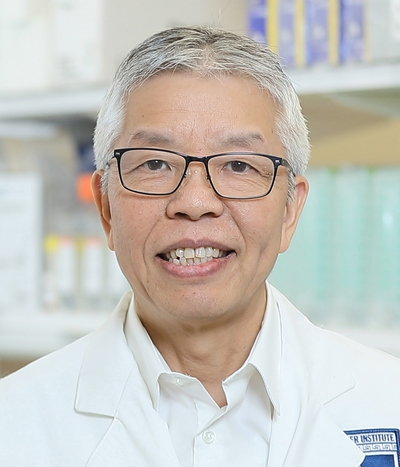
Research Topics
Research Program and Goals
My laboratory focuses on the genetics, genomics, and biochemical pathways related to human cancers, with a particular emphasis on primary liver cancer. Primary liver cancer ranks among the top five deadliest cancers worldwide and is one of the few cancer types with rising incidence and mortality rates over the past two decades, both in the U.S. and globally. Hepatocellular carcinoma (HCC) and intrahepatic cholangiocarcinoma (iCCA) are the two main forms of liver cancer. Chronic liver diseases, resulting from complex etiologies such as viral hepatitis, alcohol consumption, parasites, chemical carcinogens, unhealthy diets, or sedentary lifestyle, are significant global health burdens that increase the risk of HCC and iCCA. Despite advances in diagnostics and treatment modalities, improvements in mortality rates have been modest. These cancers are among the most challenging to treat, with a 5-year survival rate of less than 20% in the United States.
Our research aims to uncover the causes of primary liver cancer, elucidate the mechanisms driving the development of HCC and iCCA, and identify functional biomarkers to improve early detection, diagnosis, and treatment. Currently, my lab is conducting two complementary research projects aimed at addressing these challenges and improving patient outcomes.
Current Research Projects
1. Exploring molecular heterogeneity and mechanistic insights of liver cancer across diverse populations
Genomic analyses of HCC and iCCA reveal a highly complex mutational landscape, characterized by significant inter-tumor and intra-tumor heterogeneity. This complexity presents a major challenge in identifying actionable drivers of early-stage carcinogenesis and in developing diagnostic tools and effective therapies. To overcome these hurdles, identifying distinct cancer subgroups, each with similar tumor biology and specific therapeutic responses, could greatly improve patient outcomes.
To this end, we have established several national and international collaborative projects. We employ molecular-based technologies such as genomics, transcriptomics, metabolomics, and microbiomics, including single-cell omics to characterize liver specimens across diverse populations. This approach aims to better define liver tumor molecular subtypes with unique tumor biology and develop predictive tools for early onset and treatment response. Additionally, we are investigating the genetic basis underpinnings of metabolic-associated steatohepatitis (MASH), a key contributor to the rising global incidence of HCC. To explore MASH-related HCC, we have developed genetically engineered mouse models to examine the underlying mechanisms. These efforts will improve our understanding of liver cancer and lead to more accurate diagnoses and personalized treatments, ultimately advancing global cancer health research and improving outcomes for patients worldwide.
2. Investigating the roles of microbiome on cancer risk, early detection, and preventive measures
Early detection of liver cancer can be lifesaving, but current methods remain inadequate. For example, circulating tumor cell-specific biomarkers often lack sensitivity and specificity due to their low abundance. Additionally, the molecular characteristics of cancer cells are heterogeneous, both across different tumors and within individual tumor lesions, and these characteristics can change over time. This variability complicates the identification of stable, tumor cell-specific biomarkers for early-stage HCC and iCCA. As a result, most HCC and iCCA cases are diagnosed at advanced stages, limiting the availability of potentially curative treatments and contributing to poor survival rates. Therefore, there is an urgent need for an effective biomarker-guided surveillance program for early liver cancer detection and prevention.
Our lab has been investigating the use of phage display immunoprecipitation sequencing (PhIP-seq) to analyze serological microbial antigen repertoires as synthetic biomarkers for risk stratification and early detection of liver cancer. This approach is based on the idea that pathogenic microbes can influence human health by altering host immunity, making the interaction between the microbiome and the host a key factor in the development of chronic diseases, including cancer. Microbial infections leave behind distinct molecular signatures, such as anti-microbial antigen-specific antibodies, which can affect an individual’s susceptibility to cancer. While certain viruses, such as HBV/HCV in HCC and HPV in cervical cancer, are well-known carcinogens, evidence suggests that some viruses may also have protective effects for their hosts.
Because cancer often arises when immune surveillance fails to eliminate abnormal cells, we hypothesize that lifelong microbial exposure shapes a unique microbial landscape and individualized immune profile that could serve as a stable set of synthetic biomarkers for the early detection of liver cancer. This approach could also help identify beneficial viruses that may be exploited for cancer vaccines. By leveraging this novel strategy, we aim to transform early liver cancer detection and open new avenues for therapeutic interventions, ultimately improving patient outcomes.
Biography
Dr. Wang grew up in Shanghai, China, where he received early medical training in general medicine and served as a 'barefoot' doctor in a State Farm Clinic for two years before enrolling at Shanghai First Medical College, now a part of Fudan University, to complete his baccalaureate degree. In the mid-1980s, he moved to the United States to pursue a Ph.D. at the New York University School of Medicine. Following his Ph.D., Dr. Wang completed postdoctoral training at the Roche Institute of Molecular Biology and later at the National Cancer Institute (NCI). In 1998, he joined NCI as a tenure-track investigator and was promoted to tenured Senior Investigator in 2005. In 2023, Dr. Wang was appointed as Deputy Director of the Center for Cancer Research (CCR) at NCI.
Dr. Wang's laboratory utilizes advanced technologies to investigate primary liver cancer. He has led several major international research initiatives on liver cancer genomics, collaborating with multiple universities and cancer centers globally. His contributions have been widely recognized, earning him prestigious honors such as the NIH Merit Award, the NCI Director's Award, the NIH Asian & Pacific Islander American Organization Award, and the Blue Faery Award for excellence in liver cancer research. Dr. Wang also received the NCI Mentor of Merit Award for his exceptional mentorship in cancer research. Dr. Wang holds an Honorary Professorship from Fudan University and has been honored with the Outstanding Leadership and Service Award from the Society of Chinese Bioscientists in America (SCBA), along with NCI Director’s Award for Emerging Leader. Dr. Wang has coauthored over 290 peer-reviewed scientific articles and book chapters and is a frequent speaker at international conferences and academic institutions. Additionally, he also serves on numerous scientific committees and provides editorial and grant review services.
Selected Publications
- Liu J, Tang W, Budhu A, Forgues M, Hernandez MO, Candia J, Kim Y, Bowman ED, Ambs S, Zhao Y, Tran B, Wu X, Koh C, Surana P, Liang TJ, Guarnera M, Mann D, Rajaure M, Greten TF, Wang Z, Yu H, Wang XW. A Viral Exposure Signature Defines Early Onset of Hepatocellular Carcinoma. Cell. 2020;182(2):317-328.e10.
- Ma L, Hernandez MO, Zhao Y, Mehta M, Tran B, Kelly M, Rae Z, Hernandez JM, Davis JL, Martin SP, Kleiner DE, Hewitt SM, Ylaya K, Wood BJ, Greten TF, Wang XW. Tumor Cell Biodiversity Drives Microenvironmental Reprogramming in Liver Cancer. Cancer Cell. 2019;36(4):418-430.e6.
- Chaisaingmongkol J, Budhu A, Dang H, Rabibhadana S, Pupacdi B, Kwon SM, Forgues M, Pomyen Y, Bhudhisawasdi V, Lertprasertsuke N, Chotirosniramit A, Pairojkul C, Auewarakul CU, Sricharunrat T, Phornphutkul K, Sangrajrang S, Cam M, He P, Hewitt SM, Ylaya K, Wu X, Andersen JB, Thorgeirsson SS, Waterfall JJ, Zhu YJ, Walling J, Stevenson HS, Edelman D, Meltzer PS, Loffredo CA, Hama N, Shibata T, Wiltrout RH, Harris CC, Mahidol C, Ruchirawat M, Wang XW, TIGER-LC Consortium.. Common Molecular Subtypes Among Asian Hepatocellular Carcinoma and Cholangiocarcinoma. Cancer Cell. 2017;32(1):57-70.e3.
- Dang H, Takai A, Forgues M, Pomyen Y, Mou H, Xue W, Ray D, Ha KCH, Morris QD, Hughes TR, Wang XW. Oncogenic Activation of the RNA Binding Protein NELFE and MYC Signaling in Hepatocellular Carcinoma. Cancer Cell. 2017;32(1):101-114.e8.
- Ji J, Shi J, Budhu A, Yu Z, Forgues M, Roessler S, Ambs S, Chen Y, Meltzer PS, Croce CM, Qin LX, Man K, Lo CM, Lee J, Ng IO, Fan J, Tang ZY, Sun HC, Wang XW. MicroRNA expression, survival, and response to interferon in liver cancer. N Engl J Med. 2009;361(15):1437-47.
Related Scientific Focus Areas





Molecular Biology and Biochemistry
View additional Principal Investigators in Molecular Biology and Biochemistry
This page was last updated on Monday, January 12, 2026